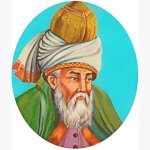Jalal ad-Din Mohammad Balkhi Day in Tajikistan Date in the current year: September 30, 2026
 Jalal ad-Din Mohammad Balkhi Day is an official observance in Tajikistan. It is celebrated on September 30 to commemorate the birthday of a renowned Persian poet and scholar who made a great contribution to the development of Tajik culture.
Jalal ad-Din Mohammad Balkhi Day is an official observance in Tajikistan. It is celebrated on September 30 to commemorate the birthday of a renowned Persian poet and scholar who made a great contribution to the development of Tajik culture.Jalal ad-Din Mohammad Balkhi, also known as Jalal ad-Din Mohammad Rumi or simply Rumi, was born on September 30, 1207 in the historic region of Bactria, also known as Balkh. Balkhi and Rumi are his nisbas (parts of the name indicating his place of origin), meaning, respectively, “from Balkh” and “from Rûm” (Byzantine Anatolia). Rumi is considered to be a descendant of Abu Bakr, the first caliph of Islam.
Rumi’s family had to leave Balkh due to the Mongolian invasion of Central Asia. They eventually settled down in Anatolia, where Rumi’s father became the head of a madrasa (religious school) in Konya.
Under his father’s guidance Rumi received an excellent education. He studied the Quran and its interpretations, learned Arabic, Turkish and Greek in addition to his native Persian, and even studied science alongside theology and jurisprudence. During his formative years, Rumi was greatly influenced by Sufi poets such as Attar of Nishapur, Sana’i Ghaznavi, and Najm al-Din Kubra.
Following his father’s death in 1231, Rumi inherited his position as a mawlawi (scholar and teacher). He also became an Islamic jurist and issued fatwas. In the 1240s, Rumi met Shams-i Tabrizi, a Persian poet and dervish. This meeting completely changed his life; Rumi became an ascetic and devoted the rest of his life to spreading Sufi ideas and composing poetry.
Rumi wrote mainly in Persian, but sometimes also used Turkish, Arabic, and Greek. He composed qasidas, ghazals, and ruba’is, which were included in his collection of poems entitled Diwan-i Shams-i Tarbizi, also known as Diwan-i Kebir. In addition to poetic works, Rumi’s legacy includes talks, lectures and sermons recorded by his disciples.
Rumi’s best known work is the Masnavi, an extensive poem consisting of six books that collectively amount to 25,000 beits (couplets) or 50,000 lines. Sometimes referred to as “the Quran in Persian”, the Masnavi is widely regarded as the world’s greatest mystical poem and as one of the most important works of Sufi literature. The poem does not have a framed plot; it consists of multiple scenes and reflections, imbued with the same mood and following a similar structure.
Rumi’s cultural influence transcends ethnic divisions and national borders. His spiritual legacy has been appreciated by Greeks, Iranians, Pashtuns, Tajiks, Turks, and other Muslims of Central Asia and the Indian subcontinent. In Tajikistan, he is considered one of the founders of classical Tajik literature.
In 2009, the President of Tajikistan declared Jalal ad-Din Mohammad Balkhi’s birthday an official holiday to emphasize Rumi’s contribution to the development of Tajik and world literature and culture. The holiday is marked by exhibitions, conference, poetry readings, and other events celebrating Rumi’s legacy.
- Category
- Cultural Observances
- Country
- Tajikistan
- Tags
- Jalal ad-Din Mohammad Balkhi Day in Tajikistan, Rumi, holidays in Tajikistan, cultural observances